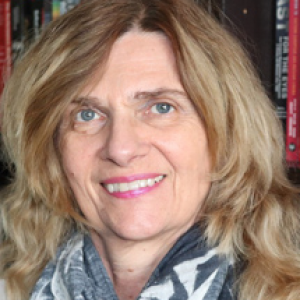Pracownicy

dr hab.
Elżbieta Ostrowska
Profile naukowe, dydaktyczne i społecznościowe
Czym się zajmuję - opis stanowiska
adiunkt
prowadzenie badań naukowych oraz prowadzenie zajęć dydaktycznych
Biogram
Absolwentka kulturoznawstwa Uniwersytetu Łódzkiego. Tytuł doktora nauk humanistycznych uzyskała w 1997 roku na podstawie rozprawy Formalny aspekt konstrukcji przestrzennych w filmie fabularnym. W latach 1988-1997 – pracownik naukowo-dydaktyczny w Katedrze Mediów i Kultury Audiowizualnej UŁ. W latach 2004-2021 – Associate Lecturer w Department of English and Film Studies Uniwersytetu Alberty w Kanadzie. Obecnie realizuje w Katedrze Mediów i Kultury Audiowizualnej UŁ projekt badawczy „Transnarodowe kino Agnieszki Holland” finansowany ze środków Norweskiego Mechanizmu Finansowego na lata 2014-2021.
Zainteresowania
kino polskie, kino transnarodowe, kino kobiece, feminizm, studia genderowe, kino Europy Środkowo-Wschodniej
Osiągnięcia
Granty:
"Transnarodowe kino Agnieszki Holland" Projekt badawczy finansowany ze środków Norweskiego Mechanizmu Finansowego na lata 2014-2021, nr 2020/37/K/HS2/02327
Książki (wybór):
The Films of Agnieszka Holland, Edinburgh: Edinburgh University Press, 2024.
The Cinematic Bodies of Eastern Europe and Russia. Between Pain and Pleasure, ed. Ewa Mazierska, Matilda Mroz, Elżbieta Ostrowska. Edinburgh: Edinburgh University Press, 2016.
Ewa Mazierska, Elżbieta Ostrowska, Women in Polish Cinema. Oxford, New York: Berghahn Books, 2006.
The Cinema of Roman Polanski. Dark Spaces of the World, ed. John Orr, Elżbieta Ostrowska, London: Wallflower Press, 2006.
The Cinema of Andrzej Wajda. The Art of Irony and Defiance, ed. John Orr, Elżbieta Ostrowska. London: Wallflower Press, 2003.
Elżbieta Ostrowska, Przestrzeń filmowa, Kraków: Rabid, 2000.
Artykuły/Rozdziały w tomach zbiorowych (ostatnio opublikowane)
<h1></h1>“Anima(l) Moralia , or Righteous Anger: Agnieszka Holland’s Spoor”, Film-Philosophy vol. 28 , no. 2 , 2024, pp. 202-225.
“Agnieszka Holland's Starburst Career: From Persona non Grata to International Celebrity on Multiple Fronts", [w:] Stardust and Starlight: Slavic Screen Celebrities, red. Helena Goscilo, Boston: Academic Studies Press, 2024, ss. 125-155.
“Secret Agents, Informers, and Traitors: Agnieszka Holland’s Fever(Gorączka, 1980)”, Studies in Eastern European Cinema, (2022) DOI: 10.1080/2040350X.2022.2125221
“Paweł Pawlikowski’s Cold War: Music, Space, and Identity”, in Helena Goscilo, ed.,Singing a Different Tune: The Slavic Film Musical in a Transnational Context, Boston: Academic Studies Press, 2023, pp. 116-140.
<h1></h1>„Duma i uprzedzenie – krytyczne dyslokacje filmu «Zabić księdza» Agnieszki Holland”, Kwartalnik Filmowy, (116), pp. 146-170. doi: 10.36744/kf.918.https://czasopisma.ispan.pl/index.php/kf/article/view/918;
“The (In)discreet Charm of the Romans: Quo vadis (dir. Jerzy Kawalerowicz, 2001). In: The Novel of Neronian Rome and its Multimedial Transformations: Sienkiewicz’s Quo vadis. Edited by: Monika Woźniak and Maria Wyke, Oxford University Press 2020.
“Reluctant Feminists, Powerless Patriarchs, and Estranged Spectators: Gender in Post-1989 Eastern European Cinema.” Feminist Encounters: A Journal of Critical Studies in Culture and Politics. 4(2), 2020; https://doi.org/10.20897/femenc/8520
“Bodily Violence and Resistance in Wojtek Smarzowski’s Rose (Róża, 2011)”, Baltic Screen Media Review, 6 (1), 2018, 38-55. doi: https://doi.org/10.2478/bsmr-2018-0003
“Emotional investments: Contemporary Polish romantic comedy and neoliberalism.” Literatura i Kultura Popularna, vol. 28, 2018, pp. 143-153. DOI: 10.19195/0867-7441.24.11
“Negotiating the Aesthetic: The Politics of Polish Postwar Cinema.” Being Poland: A New History of Polish Literature and Culture since 1918 Ed.by Tamara Trojanowska et al., Toronto: University of Toronto Press, 2018, pp. 691-712.
“Exquisite cadaver” according to Stanisław Lem and Andrzej Wajda. Open Cultural Studies, 2:1, 2018, pp. 103-113. doi:10.1515/culture-2018-0010.
“Developments in Eastern European Cinemas since 1989 (with Joanna Rydzewska). The Routledge Companion to World Cinema. Eds. Rob Stone at al. London, New York: Routledge. 2018.
“Corporations of Feelings: Romantic Comedy in the Age of Neoliberalism.”in Contemporary Cinema and Neoliberal Ideology. Eds. Ewa Mazierska, Lars Kristensen. London, New York: Routledge. 2018. 233-246.
“The Power of Love: Polish Postcommunist Popular Cinema.” Popular Cinemas in East Central Europe: Film Cultures and Histories. Edited by: Dorota Ostrowska, Francesco Pitassio, Zsuzsanna Varga. New York, London: IB Taurus. 2017.
“Vanishing women. Łódź women textile workers in Polish documentary cinema”.Studiesin Documentary Film, DOI: 10.1080/17503280.2017.1335565
“Women Who Eat Too Much: Consuming Female Bodies in Polish Cinema.” in Transgressive Women in Modern Russian and East European Cultures. From the Bad to the Blasphemous Eds. Yana Hashamova, Beth Holmgren, and Mark Lipovetsky. New York, London: Routledge, 2017. 128-142.
“Introduction: Shaping the cinematic bodies of Eastern Europe and Russia.” (co-authored with Ewa Mazierska and Matilda Mroz). The Cinematic Bodies of Eastern Europe and Russia. Between Pain and Pleasure. Eds. Ewa Mazierska, Matilda Mroz, and Elzbieta Ostrowska. Edinburgh: Edinburgh University Press, 2016. 1-28.
“What Does Poland Want From Me?’: Male Hysteria in Andrzej Wajda’s War Trilogy.” The Cinematic Bodies of Eastern Europe and Russia. Between Pain and Pleasure. Eds. Ewa Mazierska, Matilda Mroz, Elzbieta Ostrowska. Edinburgh: Edinburgh University Press, 2016. 31-52.
“‘I will wash it out’: Holocaust Reconciliation in Agnieszka Holland's 2011 Film In Darkness.” Holocaust and Genocide Studies 29: 1 (2015): 57-75.
“Formless world and ‘paperless people.” Short Film Studies 5: 1 2015, pp. 53–56.
„Transgressionen und Regressionen. Männlichkeitsdilemmata in den frühen Filmen von Polanski, Skolimowski, Żuławski und Królikiewicz“. Nouvelle Vague Polonaise? Auf der Suche nach einem flüchtigen Phänomen der Filmgeschichte. Ed. Margaret Wach. Marburg: Schuren, 2015. 150-166.
“Post-colonial Fantasies. Imagining the Balkans: the Polish popular cinema of Władysław Pasikowski.” Postcolonial Approaches to Eastern European Cinema. Portraying Neighbours On-Screen. Ed. Ewa Mazierska, Lars Christens, Eva Naripea. London, New York: IB Taurus 2014. 175-199.
“Agnieszka Holland’s Transnational Nomadism.” Polish Cinema in the International Context. Ed. Michael Goddard, Ewa Mazierska. Rochester: Rochester University Press, 2014.
“Invisible Deaths: Polish Cinema’s Representation of Women in World War II.”Embracing Arms. Cultural Representation of Slawic and Balkan Women in War. Eds. Helena Goscilo, Yana Hashamova. Budapest, New York: Central University Press 2012. 29-58.
Dyżury
adiunkt
DYŻURY CYKLICZNE
CZWARTEK
16:45 - 17:45
Pomorska 171/173 90-236 Łódź
Kontakt
adiunkt
www: http://ikw.uni.lodz.pl/transnarodowe-kino-agnieszki-holland/
Pomorska 171/173 90-236 Łódź
ul. Narutowicza 68, 90-136 Łódź
NIP: 724 000 32 43
Adres do doręczeń elektronicznych (ADE): AE:PL-74796-17640-IHHIV-17
KONTAKT
